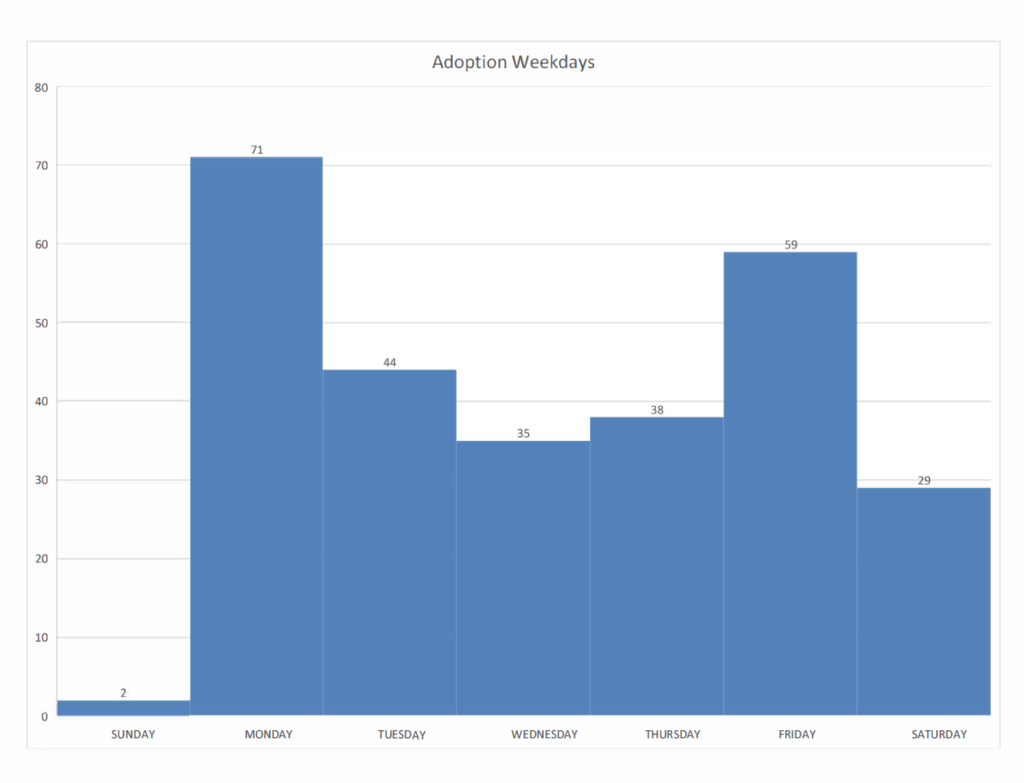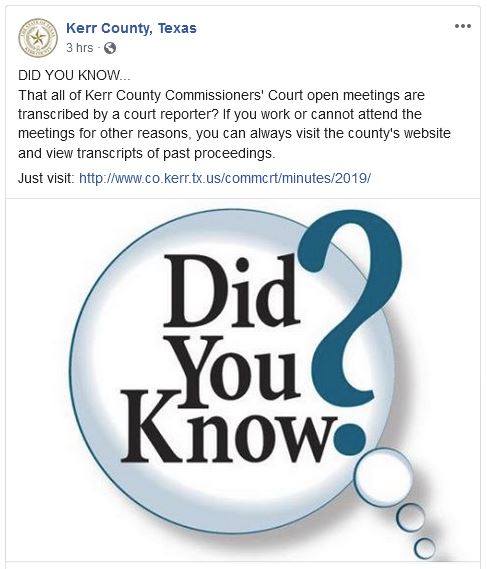
Kerr County Commissioners Court issued a new press release on Tuesday to defend an action that was taken last week to change the days and hours of operation, and amend volunteer policies, at the Kerr County Animal Shelter. Commissioners received intense criticism not only for the effects these changes will have on the animals and volunteers, but also for the way the policies were rolled out. For more context about the specific policy changes, please read our previous article on this subject.
Commissioners met in closed Executive Session on October 15 and decided a policy for the animal shelter without consulting their advisory board, without public input, and without ample time for the shelter staff to roll out the policy effectively. They implemented policies that were unclear, and, after issuing an updated statement following a negative editorial in the Kerrville Daily Times, the court has muddied the waters on what might be their true motives for these changes. Further, we have reason to question the adoption statistics that they relied on to support this decision.
A Kerrville Daily Times poll found that 96% of respondents disagreed with the Commissioners’ decision to change these policies. 550 people responded to the non-scientific poll on the Times’ Facebook page.
Regardless of how you may feel about the underlying policy changes — closing on Saturdays and adjusting the volunteer policies — the rollout was less than ideal for a governmental body that ostensibly works for the people of Kerr County.
Meeting Behind Closed Doors
On Tuesday, October 15, the Commissioners Court convened a regular meeting of the court (held on Tuesday instead of the usual Monday meetings due to county offices closing for Columbus Day). On that agenda was an item described simply as, “Consider, discuss and take appropriate action regarding the Animal Services Department. (Executive Session) (Judge Kelly/Reagan Givens)”.

This agenda item, as described, did not have anything to do with personnel matters. However, when this item came up for discussion, Commissioners adjourned to Executive Session, which is a closed, non-public session, which must be conducted according to state law on open meetings.
By default, all local government meetings must be held in public, and all items discussed must be clearly posted in advance. All of the discussions must happen in open session unless they discuss a topic that is specifically enumerated in the Texas Government Code as eligible for discussion in Executive Session. All elected officials receive training on the Open Meetings Act to be sure that they operate within these state laws.
When Kerrville United inquired as to which section of the Government Code was used as the justification for closed Executive Session, we were told by county officials that the Commissioners invoked Section 551.074, which refers to personnel matters. However, as you can see below, this section refers to specific employment matters such as evaluations, discipline, complaints, etc. This justification to enter into Executive Session bears no resemblance to the agenda item, as posted, or to the matters that were actually discussed in that session.

It was during this closed Executive Session that Commissioners built consensus around adjusting the hours, days of operation, and volunteer policies at the Animal Services Facility (animal shelter), although the unanimous vote did take place in public session, as required by law (no action can be taken in Executive Session — only discussion, which builds consensus). Should the discussion of hours, days of operation, and volunteer policies of an entire county department qualify for Executive Session under Section 551.074? The Texas Attorney General’s 2018 Open Meetings Handbook clearly states that discussions about a “class” of employees cannot be held in closed session. See page 48 of the Handbook.
Since this matter was not represented transparently on the agenda, and since the matter was discussed in Executive Session, the Commissioners chose to act without any public input on this topic. The public had no idea that operating days/hours would be discussed, and even if a member of the public had attended the meeting to provide input, they would have been shut out of the closed Executive Session. Therefore the court made this decision without any public input whatsoever.
Upon examination of all these facts, it is our conclusion that the Commissioners may not have had the legal right to discuss these policies in closed session. As such, Kerrville United will submit a public records request to obtain the transcribed minutes and/or audio recordings of this portion of the meeting. It is likely that the county will object to handing over this documentation, and will probably refer the matter to the Attorney General for a ruling. We look forward to hearing why the county felt it was appropriate to enter into Executive Session under a personnel statute to discuss the hours of operation of a taxpayer-funded county facility.
Founding Father Patrick Henry once said of the importance of transparency in government, “The liberties of a people never were, nor ever will be, secure when the transactions of their rulers may be concealed from them.”
Opening page of the Open Meetings Handbook, letter from Ken Paxton, Attorney General
Garbage In, Garbage Out (Bad Statistics?)
One of the major policy changes rolled out by the Commissioners on Tuesday was to change the days and hours of operation, eliminating Saturdays completely. When county officials were asked about the prudence of closing a facility that relies on public adoptions, officials confidently stated that only a small percentage of adoptions actually took place on Saturday. So, Kerrville United made a public records request to get a list of all adoptions for 2019. We received a list of adopted animals with the dates they were adopted (however, we only received data from February 1 through September 30 — not the entire year of 2019).
We must note that the data we received from the county does not match the statistics they quoted in their October 21 press release that followed the scathing editorial in the Kerrville Daily Times.
The data we received showed a total of 278 adoptions during the time period from February 1 through September 30. According to the data, approximately 10% of all adoptions occurred on Saturdays, and approximately 26% of the adoptions took place on Mondays. See the graph below that shows how many adoptions took place on each day of the week.

There are a couple of potential problems with this data. First, the data shows that two adoptions took place on Sunday. This is curious, since the shelter is not, and has never been, open on Sundays.
Second, we found it strange that so many adoptions took place on Mondays. Why would this day be the most popular for a family to visit the shelter, become acquainted with the animals, spend time with them, and then commit to an adoption? We inquired with shelter volunteers about this data, and found two reasons that could cause these statistics to be inaccurate.
- Data isn’t always entered on Saturdays. There is just one employee at the shelter that enters adoption data into the records. This person does not generally work on Saturdays, so many of the Saturday adoptions were likely to be entered when this person returned to work on Monday, skewing the date statistics to show more adoptions on Mondays rather than Saturdays.
- Families may “host” an animal starting on Saturday, but may not commit to the adoption until the following week. This standard operating procedure may skew the statistics to show more adoptions during the week, but they may have actually been initiated on Saturday.
Even if we accept these statistics as presented to us by the county, we see that a full 10% of all adoptions happened on Saturday. Keep in mind that the facility was only open for TWO HOURS each Saturday. The county stated in their recent press release that, under the old hours, the facility was open to the public for a total of 39 hours per week. That means that, if we accept these stats, 10% of all adoptions took place during only 5% of the available public hours. So Saturdays are an extremely popular day to adopt animals. If Saturday hours are increased to more than two hours, it follows that the number of adoptions could be even higher on weekends.
After examining all of these factors, it is our conclusion that the county may have relied on faulty or unclear information when deciding the new operating days/hours. We would encourage the county and the Animal Services department to be more transparent with their operating procedures to discover whether or not these daily numbers are correct. Even if they are correct, though, the county is wrong when they suggest that Saturdays were not productive for the facility. In fact, Saturday hours were very much over-represented in the data, meaning Saturdays are actually very popular days for adoptions, and eliminating them will cause more animals to be euthanized instead of becoming adopted pets.
Advisory Board Not Consulted
As part of the 2018 Interlocal Agreement between the City of Kerrville and Kerr County regarding Animal Services, an Animal Advisory Board was created to meet regularly and advise the county about shelter operations. The board is required to include a licensed veterinarian, a county commissioner, the animal services director, a representative from a local nonprofit shelter, and a city resident (appointed by the Kerrville City Council).
Kerrville United reached out to members of the advisory board. The board had not been advised or notified about the agenda item posted for October 15, nor was the board consulted about the potential change in hours and policies. No one from the advisory board (other than Commissioner Letz and Animal Services Director Reagan Givens) was present at the Commissioners Court meeting on October 15. And, of course, since the matter was discussed in closed session, advisory board members would not have been allowed to participate in that meeting.
So although the County established this board via Court Order 37057 on October 9, 2018, the county did not seek input from their own appointed experts before making a decision. This is just another example of the County acting without any public input — from the general public or from its own citizen advisory board.
Volunteer Hours to be Reduced
In addition to the change in hours and days of operations, the Saturday closure will also have the effect of reducing the number of volunteer hours that are provided to the shelter by local animal lovers. According to county data, volunteers provide an average of 5 hours of labor each Saturday, with up to 13 volunteer hours given on one Saturday (March through September 2019).
We spoke with several volunteers who have stated that they will no longer be able to give any volunteer hours at all now that the shelter will be closed on weekends. Volunteers also stated that many of the hours they serve are not recorded, and therefore won’t show up in this data provided by the county.
With the new policy, volunteers are now required to sign up days in advance, but without the convenience of offering online signups or telephone signups. These already busy volunteers will now be asked to show up in person during the new shelter hours to volunteer for a certain amount of time many days in advance. This hardship will further reduce the volunteerism that has benefited the shelter thus far, and the hardship could be reduced with the help of a simple online form.
Ulterior Motives?
The stated reasons for the shift in policies were as follows (according to last week’s press release):
- Reduce the expense of compensatory payroll costs
- Increase public access to services
Rational arguments can be made on whether or not either of these objectives will be reached with the new policies, but when the county updated their Facebook post on Sunday, October 20, the true motivation behind these changes may have been revealed. The county edited their Facebook page to include the following statement:
“County leaders stated that what KCAS needs is a local, nonprofit organization to work with to help house and adopt pets. This idea has been brought up numerous times to the local pet advocacy groups and, hopefully, this will take place in the future.”
Facebook release originally posted on October 16, and edited on October 20.

Conversations with various county officials make it clear that the county does not want to be in the business of providing adoption services whatsoever. In this Facebook post, the October 21 press release, and in those private conversations, it’s clear that the county’s true motive is to encourage local advocates to setup and operate an adoption facility so that the county can concentrate on state-mandated health activities such as rabies control, saving money in an already maxed-out budget, and reducing the workload for county employees.
But if that’s the true motivation behind these policy changes, why was it only stated following a very negative public reaction and newspaper editorial?
The other stated motivation is to reduce payroll expenses by reducing the number of “accrued comp time.” But this can be achieved without incurring any additional comp time hours if the county would simply adjust shelter hours on other weekdays. For example, why not close on Monday or Tuesday mornings and keep a small number of hours on Saturday? Commissioners have not yet explained why this wasn’t considered.
What’s Next?
The County met on Monday morning, October 21, and one of the agenda items had to do with the shelter. However, since the county does not broadcast their meetings, nor do they provide meeting minutes in a timely manner, we do not yet know the outcome of today’s proceedings.
We encourage the county to operate with greater transparency, including revisiting the matter of recording and/or broadcasting their meetings publicly so that the voters can view discussions and participate with county matters. The regular Commissioners Court meetings take place at 9 AM on Monday mornings, which makes it impossible for working folks to attend or participate in any way.
Ironically, just today, the county posted this Facebook post (below) inviting the public to view the meeting minutes if they’d like to keep up with county matters. Upon visiting the page with the minutes, the latest available meeting minutes posted was the meeting that took place on September 16 — over a month ago. No sign of the minutes from October 15 or October 21.

If the county wants the public to refer to the minutes to keep up with their representatives’ work, we suggest they make them available more quickly. But we have an even better suggestion… follow the City’s lead and provide audio and video recordings of every meeting within 24 hours. We’ll be happy to donate equipment and help set that up in the interest of public access!
But for now, the bottom line is that, like it or not, the county IS in the business of providing adoptions so that the number of animals that must be euthanized is kept to as few as possible. Until such time as a nonprofit is setup, the county must act in good faith and continue to operate the shelter with at least some weekend access to benefit the majority of county families that work on weekdays. This can be achieved by adjusting hours on another day of the week, such as Mondays or Tuesdays. No comp time needs to accrue to maintain Saturday hours.
Most of all, though, the county should reflect upon this decision-making process, the lack of transparency, and the complete dearth of public input that was sought before making this dramatic change to public policy. We expect more from our elected officials.
This article contains verifiable facts, and the conclusions and recommendations represent the opinion of Kerrville United, but not of any other entity, group, organization, or government body. Efforts have been made to verify the authenticity of all information presented. This article may be updated from time to time as new information is discovered.




